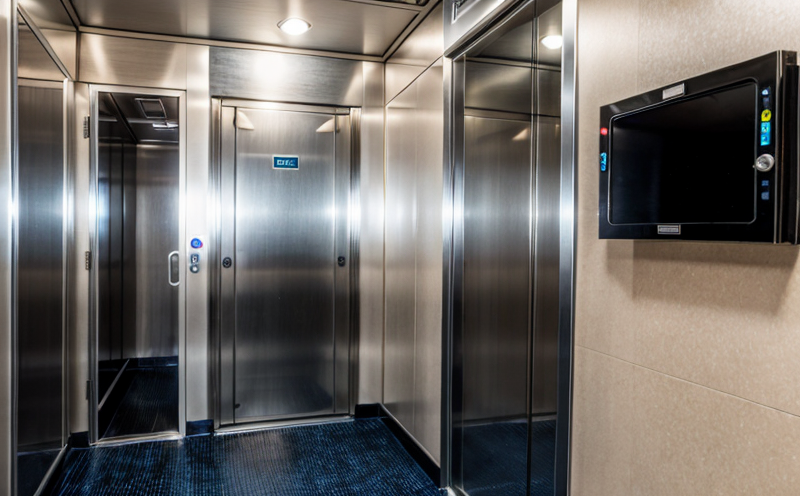Elevator cabin inspection
The elevator cabin is a critical component of any elevator system. Its design and construction are subject to stringent safety standards aimed at ensuring the well-being of passengers and operators. This service focuses on thorough inspections of elevator cabins, adhering to international standards such as ISO 18736:2019 and ASME A17.1-2017, which provide comprehensive guidance for elevator safety and performance.
The inspection process involves a detailed examination of the cabin's structural integrity, materials used, and overall design compliance with relevant codes and regulations. The primary objective is to identify any potential hazards or defects that could compromise passenger safety. This includes checking the quality of the doors, door operation mechanisms, lighting systems, emergency stop buttons, and control panels.
For the structural components of the cabin, inspections typically involve visual assessments supplemented by non-destructive testing (NDT) methods such as ultrasonic testing or magnetic particle inspection to detect any hidden flaws. The integrity of materials used in the construction is also evaluated, ensuring they meet specified standards for strength and durability.
Compliance with safety regulations is crucial during this process. Elevator cabins are subject to periodic inspections to ensure ongoing compliance with applicable codes and standards. Regular maintenance records and previous inspection reports provide valuable context for these evaluations. By conducting rigorous inspections, we aim to prevent accidents caused by outdated or improperly maintained equipment.
During the cabin inspection, attention is also paid to ergonomic considerations. This ensures that cabins are designed in a way that enhances passenger comfort while adhering to safety requirements. Ergonomically optimized cabins can improve user experience and reduce operator strain during daily operations.
The importance of elevator cabin inspections cannot be overstated. These inspections serve as the first line of defense against potential hazards, ensuring that any identified issues are addressed promptly before they escalate into more serious problems. By adhering to strict inspection protocols and leveraging advanced testing techniques, we provide clients with peace of mind knowing their elevators meet all necessary safety standards.
Our team uses state-of-the-art equipment and methodologies to conduct these inspections. This includes specialized tools for measuring dimensions precisely, high-resolution cameras for detailed visual examinations, and sophisticated software for analyzing collected data accurately. All findings are documented comprehensively, providing clear evidence of compliance with relevant codes and regulations.
Industry Applications
- Commercial buildings
- Residential complexes
- Offices
- Hospitals
- Airports
Elevator cabin inspections are essential across various sectors, particularly in high-traffic areas where passenger safety is paramount. Commercial buildings and residential complexes benefit from regular inspections to maintain compliance with local regulations and ensure the longevity of their elevators.
In offices, maintaining efficient elevator systems enhances productivity by ensuring timely transportation between floors. Hospitals require reliable elevator services to transport patients quickly and safely, reducing wait times for critical care.
Airports face unique challenges due to heavy passenger loads and frequent usage. Regular inspections help mitigate risks associated with high-traffic areas and ensure seamless operations during peak travel seasons.
Environmental and Sustainability Contributions
The focus on elevator cabin safety also has positive environmental implications. Efficient elevators contribute significantly to energy savings, which in turn reduces carbon footprints. By ensuring that elevators operate at optimal efficiency levels through regular inspections, we help buildings achieve their sustainability goals.
Elevators are a crucial part of green building initiatives aimed at reducing energy consumption and promoting sustainable practices. Properly maintained cabins not only enhance safety but also contribute to the overall environmental performance of a facility by minimizing unnecessary wear and tear on components.
Competitive Advantage and Market Impact
- Enhanced Safety Standards Compliance
- Innovative Inspection Techniques
- Prompt Issue Resolution
- Detailed Documentation and Reporting
Our elevator cabin inspection services offer a competitive edge by ensuring that our clients meet or exceed all relevant safety standards. This not only protects their reputation but also helps them avoid costly fines and potential lawsuits.
The use of innovative inspection techniques allows us to detect issues early on, which can prevent more significant problems down the line. Early detection leads to timely intervention, saving time and resources while ensuring continued safe operation of elevators.
Comprehensive documentation and detailed reporting provide transparency throughout the inspection process. This ensures that all findings are clearly communicated, facilitating informed decision-making by facility managers and other stakeholders involved in elevator management.





